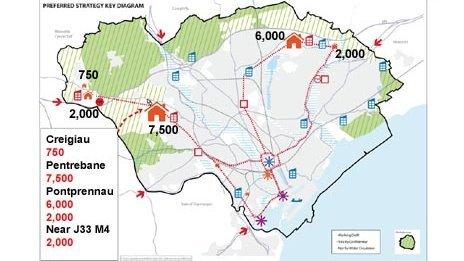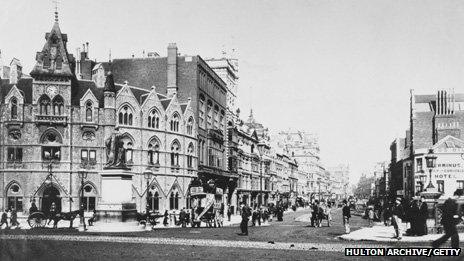Cardiff expansion: Council backs big growth plan
- Published
Councillors in Cardiff have approved plans for the largest expansion of the city for more than half a century.
The project will see 45,400 new homes built by 2026, with the Welsh capital's population predicted to top 400,000.
The blueprint also sets out investment in public transport after a warning traffic will rise by a third, increasing journey times by 40%.
More bus lanes will be introduced as the council attempts to reduce reliance on cars.
The proposals are in Cardiff council's draft Local Development Plan (LDP) preferred strategy., external
It outlines sites to build major housing and employment developments, and they include greenfield as well as brownfield.
The biggest single proposal is for 7,500 homes in a new suburb west of Pentrebane and about 6,000 and 2,000 earmarked either side of Pontprennau.
A further 2,000 homes could be built on land north of junction 33 on the M4.
Speaking before the meeting, Ralph Cook, deputy leader of Cardiff council, said: "Each of the local authorities have got their own development plans and in them are their predicted or aspired to number of properties they're going to build.
"So they are taking on some of the burden but the truth is the developers and people themselves want to live and work in Cardiff."
He said there was evidence to show Cardiff's population was "about ready to grow" and there was "a pent-up demand" for housing in the city.
"There are at least 10,000 families on the housing waiting list for instance," he said.
Daunting
The LDP states that about 40,000 jobs are planned by 2026 - a rise of 20%. The financial and business services are expecting a huge boost with 55% new jobs.
By then it is expected the capital's population could be as high as 408,000, a rise of 26%, according to the report.
A significant proportion of those arrivals are expected to come from neighbouring areas in south east Wales.

Map of locations for housing set out in the blueprint
Cardiff has about a quarter of the entire population of south east Wales but it provides around a third of the jobs.
Every day 74,000 workers commute into the city, or 37% of the workforce. Of those, 80% commute by car and this is expected to rise.
In light of this stark warning, investment in public transport will focus on new bus lanes.
It has been estimated that journey times will be 40% longer. Currently, the average journey is 17 minutes rising to 24.
The council will look at introducing car-free housing estates and whether funding two new dual carriageways in Cardiff - at the estimated cost of up to half a billion pounds.
Mr Cook said transport was essential to the city's success.
"Transport is the major challenge, of course. Cities that grind to a halt through congestion don't develop," he said.
The vote will be followed by a public consultation, and more detailed work on the plan.
Mr Cook said the plan was daunting but possible.
"The amount of development shocked me when we came into power in May, but yes, if a city is going to become what we want to be, which is a city of global renowned, a European capital city then it has to grow.
"Cities that don't grow die," he said.
Speaking ahead of the council meeting, John Punter, professor of urban design at the school of planning and geography at Cardiff University, welcomed the proposals.
"It's big in the sense that it's building in the suburbs where previously, certainly in the last decade, we've been shying away from that and pretending we could all live in apartments in the bay or around the city centre," he said.
Cardiff University urban design professor John Punter said it will be a "tough sell"
"It's certainly a major expansion of the built up area but I personally welcome it very strongly because it's time that we thought about families and more medium-density growth rather than everybody living in apartments."
He said politicians had not "grasped the nettle" over the last 10 years because of opposition from existing residents.
But Professor Kevin Morgan of Cardiff University said the council needed to "get its housing policy in order".
He said it was "politically impossible" for Cardiff to accommodate all the homes.
"I think the future is a split - some of the homes will need to be built within the city and some of the homes will need to be built within neighbouring authorities in the valleys," he said.
"This is not just a Cardiff issue.
"We've got 70-80,000 people commuting in every day to work, so Cardiff is a huge labour market and the fortunes of neighbouring areas are partly locked up with the future of Cardiff and therefore Cardiff and the region need to realise they've got a shared destiny here.
"They can achieve more by working together than they can by working separately."

Cardiff's early growth came at the end of the Victorian era
- Published25 October 2012
- Published13 July 2012
- Published17 April 2012